The rising number of female Egyptian entrepreneurs
- Published
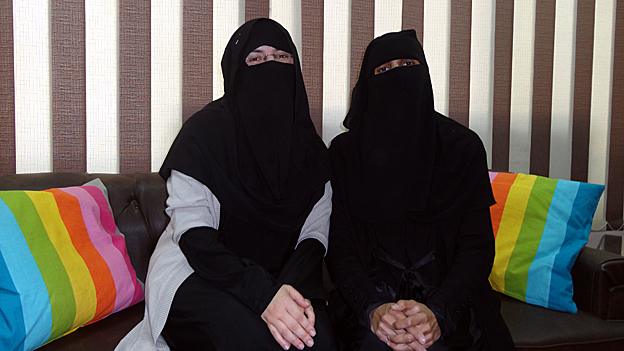
Sally Sabry (left) and Doaa Zaki say they have not faced any hostility because of their full-face veils
Friends Sally Sabry and Doaa Zaki are doubly rare in the Egyptian business community - they are both women and they both wear full-face veils.
With females accounting for only 11% of entrepreneurs in Egypt, according to a recent survey, and only one in 10 Egyptian women being fully veiled, Mrs Sabry, 28, and Mrs Zaki, 27, rather stand out.
Yet despite not looking like your typical Egyptian business owners, since 2006 they have built up a successful small company.
Despite the wider problems still faced by women in Egyptian society, and the impact of the 2011 uprising in the country, Mrs Sabry and Mrs Zaki's retail business Best Mums has gone from strength to strength.
Making products for babies and new mothers, such as breastfeeding covers and nursing pillows, they now sell 200 items a month - all made in Egypt - via their website and through supplying 12 retailers.
After setting up the business with just 300 Egyptian pounds ($40; £27) of their own money, the business partners say they never faced any hostility, only some initial puzzlement.
Mrs Zaki says she particularly remembers their first meeting with their contract manufacturer, which was owned and run by Christians.
"Now our relationships are very friendly, but at the beginning they were quite surprised," she says.
Despite neither of the two women having any prior business experience, they decided to set up the company in 2006 after Mrs Sabry had just had a baby and was looking for a job she could do from home.
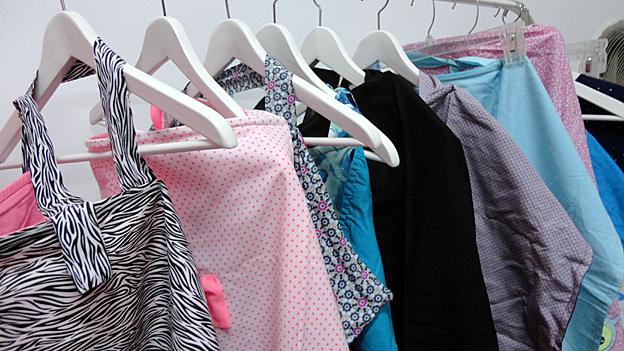
Best Mums' products are stocked at 12 shops across Egypt
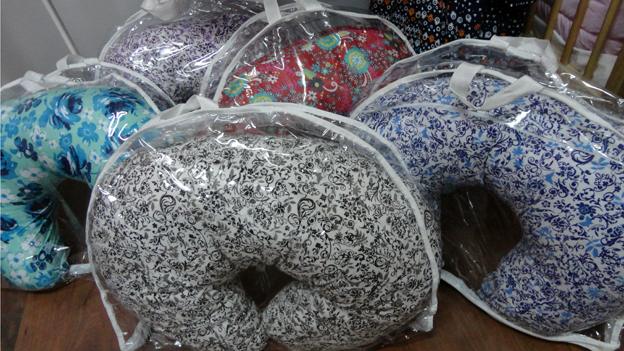
The Best Mums co-founders were looking for a business which they could start from home
Inspiration for what business it should be came after she bought a US-made breastfeeding cover, and realised that she and Mrs Zaki - who was a college student at the time - could design and make something just as good.
So launching their business, they created their products and made sure they learned all about tax requirements. They decided upon the English language name Best Mums because they believed - correctly, as it turns out - that it would please their prospective Egyptian customers.
Mrs Zaki says that running the company introduced the business partners to a wider Egypt.
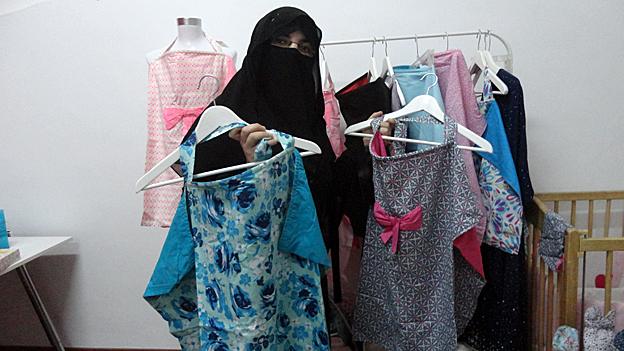
Sally Sabry is now leading Best Mums on her own
"It was very exciting. We gained self confidence," she says. "We met people of various levels and backgrounds.
"Without Best Mums we would have never left our community."
Mrs Sabry is now continuing to lead the business, but Mrs Zaki left at the end of last year to become a dentist instead. The money she earned from Best Mums enabled her to buy a luxurious surgery.
'New experience'
Another young Egyptian female businesswoman continuing to thrive is Deena Fadel, who founded home accessories business Joud in 2010.
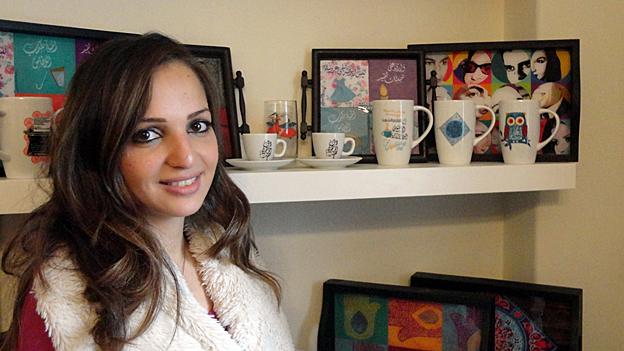
Deena Fadel now exports across the Middle East
She decided to set up the business in Cairo after becoming bored with working for an advertising agency. "I wanted to live a new experience," she says.
A keen painter, her first product was a pack of coasters that could be assembled to form a picture.
With little funds to invest in the business, Mrs Fadel, 30, says she had to explore ways to market her products for free.
Her sales took off after she contacted global design website Design Yearbook, who profiled her work.

Mrs Fadel set up Joud as she wished to have a more creative working life
Joud now sells everything from cushions to trays, mugs, lampshades and towels.
With 15 members of staff, it has two shops in Cairo, and exports to Saudi Arabia, Kuwait, Qatar, Dubai and Oman.
Despite the success of the business, Mrs Fadel, who grew up in the UK, says that in Egypt dealing with suppliers can be a headache for women entrepreneurs.
"[At the beginning] it was so hard to make them believe in my standards, and convince them that even though I first ordered only 20 pieces, it would raise to 200 or 500 pieces in one year," she says.
National problems
Although the likes of Best Mums and Joud show that female-run businesses can be successful in Egypt, studies indicate that the country is not an easy place for women to set up their own companies.
A 2014 report by the Washington DC-based think-tank Global Entrepreneurship Development Institute, which studied how straightforward it was for women to grow businesses in 30 countries around the world, put Egypt in 28th place.
Only Bangladesh and Pakistan were deemed worse, while the US, Australia and Sweden came out on top.
Amal El Mohandes, director of the women's rights defenders programme at Egyptian feminist organisation Nazra, says the problem for many Egyptian businesswomen is that they are also expected to be full-time homemakers.
She describes this as a "double burden", adding that if such female entrepreneurs "don't [also] carry out their duties in their private life, they are poorly viewed".
At the same time, though, a growing number of Egyptian women are setting up their own businesses.
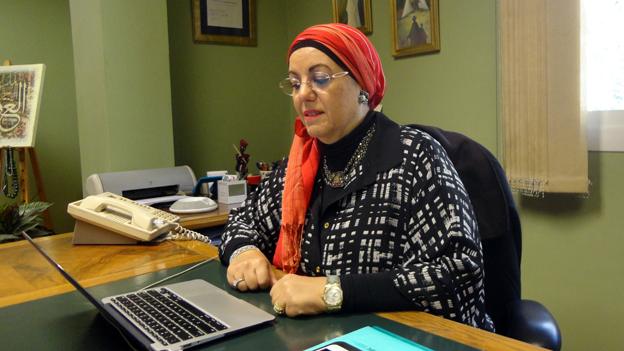
Veteran female Egyptian entrepreneur Neveen El Tahri is now investing in new start-ups
Alia El Mahdi, a professor of economics at Cairo University, says that today's rate of 11% of Egyptian entrepreneurs being women compares with just 3% eight years ago.
She says that there are two key reasons behind the rise - a lack of public sector jobs, and continuing discrimination in the private sector job market.
"The government does not recruit any more," says Prof El Mahdi. "Though men and women are equally concerned, women are more affected by this decision, since the private sector is also generally reluctant to hire them.
"Employers fear that women will be frequently off work for family reasons."
So some Egyptian women feel they have no choice but to start their own business if they want to work and earn money.
Any who are looking for inspiration could look at the career of serial entrepreneur Neveen El Tahri.
In addition to being a high-flying banker, since 1994 she has founded and grown no fewer than 13 successful businesses, which she describes as like her children.
Mrs El Tahri's latest business is called 138 Pyramids (named after the number of pyramids in Egypt), and focuses on investing in start-up companies, be they run by men or women.